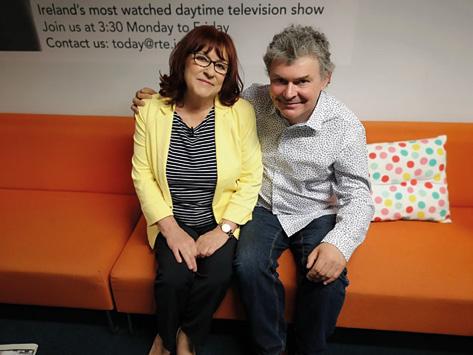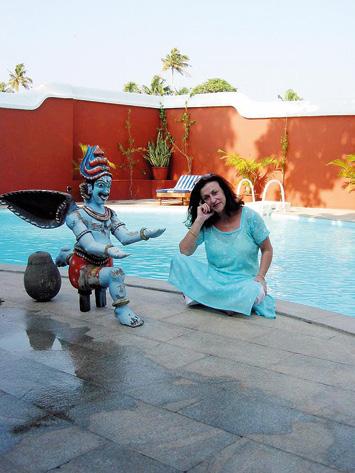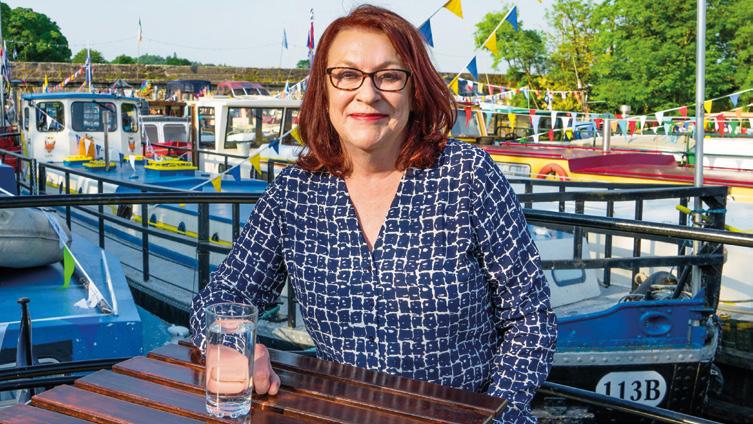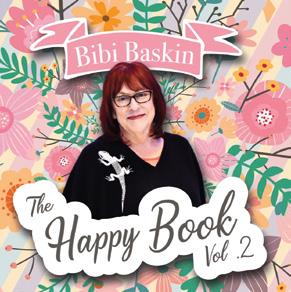
10 minute read
Bibi in a happy place
Bibi Baskin in a happy place
Bibi Baskin: ‘The patterns that rob us of happiness include, continually rushing, feeling there are never enough hours in the day, regularly eating on the run, stressing out or over-thinking problems, re-running old hurts, struggling to forgive others or ourselves, sometimes losing our cool and having an overactive racing mind.
Colette Sheridan meets the former high-profile broadcaster and hotelier
Bibi Baskin is a patient woman. This household name from the 1980s, when she was an RTE presenter and the first woman from the national broadcaster to have her own chat show, is thankfully calm when I tell her that the interview I recorded with her over the phone hasn't worked. A faulty recorder is to blame. Luckily, I have another recorder and Bibi agrees to give me quotes for the second time.
Working as a motivational speaker around the country and the author of the recently published The Happy Book, Bibi is based in Crosshaven, Cork's yachting village. But she is not interested in sailing. She lives ‘in the middle of a field’ and says she prefers to be surrounded by fertile land than facing the sea. The Donegal-reared red-head, born in 1952, who spent fifteen years in India where she ran a hotel, says she has no fear of change. Does she actively seek out new adventures? ‘It's even stronger than that. I need change. I mean what else would explain giving up a perfectly good job in RTE that was successful? I wasn't on one of the big salaries that some of them get now. It was much more modest. But why on earth would anyone leave (that job) unless you welcome change?’ Bibi left Ireland and spent five years broadcasting in London. ‘After a while, I realised that all I had done was change the geography. I hadn't changed much else.’
She went to India ‘because I quit my job in London and thought, 'what am I going to do next?' So I went there for a three-week holiday. I visited Kerala, a state in Southern India which is the home of Ayurvedic medicine (one of the world's oldest holistic healing systems.) I thought I'd learn a bit more about Ayurveda. I ended up staying in Kerala (known for its palmlined beaches and backwaters with mountains that support tea, coffee and spices on their slopes)’.
Bibi didn't miss anything about Ireland while living in India. ‘That's because I belong to a generation of Irish people who are so fortunate in comparison to, for example, my mother's generation. When they were young, they went to Liverpool, London, Australia and everywhere. But they never came back. They couldn't afford to. I always say to myself that as long as I have a credit card in my arse pocket, how could I miss somewhere? I can jump on a plane and go back.’ Speaking during lockdown, there isn't really the option to jump on a plane. We are all thrown back on our own resources. Bibi has been having ‘a good lockdown’, teaching herself Spanish, expanding her repertoire of Southern Indian cooking - and focusing on the positive.
Make yourself happy guide The Happy Book, a pocket-sized guide with tips on how to make yourself happier, has been keeping her busy. ‘The publisher, No 1 Media, came up with the idea of somehow getting a complimentary copy of the book to every resident in the nursing homes of Ireland. They have had a really tough time with Covid and it might cheer them up a bit. We can't afford to give out copies of the book on our own because there are a lot of nursing homes in the country so we're looking for businesses in communities to sponsor the books, businesses like supermarkets and pharmacists who'd have a community connection with the local nursing homes.’
Bibi's mother, who passed away aged 95 five years ago, was in a community hospital for the last stage of her life. ‘It was getting to the point where she would have had to go to a nursing home, but she died.’ Bibi, who has addressed
Bibi Baskin with fellow contributors, chef Derry Clarke, Baz Ashmawy and Aidan Power in the popular RTE TV programme Failte Towers.


Bibi Baskin with musician John Spillane

the Active Retirement Association, regrets that in Ireland, we don't always confer on older people the respect they merit given their wisdom and knowledge.
‘In India, I've seen some wonderful rituals of respect towards older people by men and women in their forties and fifties. These would be formal occasions when people would bow down and touch the feet of older people as a sign of respect. It gives me goose bumps when I think of it. I remember an author I got to know in India. Aged about fifty, he was part of the royal family of the area. When I went to visit him in his family house, he was having a cigarette. The minute his mother came into the room, he put out the cigarette out of respect.’
Indian hotel In keeping with protocol as a foreigner in India, Bibi had to have an Indian business partner when she decided to open a hotel. She thinks it's a form of protectionism. ‘I never really asked anyone about it but I think it's fair enough. India has had enough of white people coming in on their big white chargers and taking over. Westerner, you're always made to feel very special. Thinking I was English, Indians would say to me: 'Thank you madam for giving us the great Indian railway system and thank you for giving us an international language. There's no begrudgery unlike here.’
As a fluent Irish speaker from a Protestant background, Bibi is unusual. This Trinity College graduate of English and Irish grew up in Ardara in County Donegal. ‘I'd be very aware of the religious tensions and the bigotry, especially years ago, having grown up in a border county. But I don't involve myself in politics. Looking at Twitter, it seems to bring out the worst in people. It became this cesspool for people moaning about Donald Trump. I never got involved in that. The way I look at it, I'm not American and I'm never going to have an American vote. My voice doesn't matter a damn in a situation like that.’
What Bibi disliked was the way that Trump ‘brought out all this negative energy in people. I can understand it if you're in the politics business or if you're a journalist or a civil servant. Of course it mattered. But I don't want to be ever around people spewing out vindictiveness and hatred for another person.’ Bibi is very much a glass half-full person, ‘more so now than ever before. It's one of the advantages of getting older. You have more confidence in your views. That doesn't mean you're going to stay stuck but you do have more confidence.’
In keeping with her positivity, Bibi runs an online platform for subscribers called The Happy Place. It promotes mindful living. She gets people to visualise a life where they are calmer, have better relationships, experience less anger, are more in flow, have increased energy, enjoy a more positive mood and improve their sleep. The patterns that rob us of happiness include, she says, continually rushing, feeling there are never enough hours in the day, regularly eating on the run, stressing out or over-thinking problems, re-running old hurts, struggling to forgive others or ourselves, sometimes losing our cool and having an overactive racing mind.
Listening to Bibi, I'm struck by her dulcet tone. She says her voice ‘has been variously described as melting chocolate, rustling sheets and best of all, vocal Viagra!’ Whatever way you want to describe it, Bibi's voice is rich and ultimately calming. It reflects her outlook. And she uses her voice to guide people into meditation.
Bibi Baskin by the pool in her Indian hotel

what's the point in worrying about something that may never happen. Most of our fears don't happen. So I stick to that.’
Asked if she was a bit of a trailblazer because of being RTE's first female to have her own chat show, Bibi quickly dispels any such suggestion. As a career woman making her way in the world, she says her pre-occupations were paying for her house and car.
Now, Bibi's career is less frenetic and she has a much lower profile. While she never minded people coming up to her on the street, what she didn't like was the ‘incessant’ nature of being almost public property. ‘I remember being in a restaurant to celebrate a friend’s birthday. People came up to me there. In those days, they wanted autographs. Nowadays, it's selfies.’
Bibi has two older sisters. There is a considerable gap between her age and theirs. She says she is not particularly close to them. Her father died when she was just six. Aged fifty, he had taken her for a walk after school on a wet winter's day. Two hours later, he died from a heart attack. Bibi's mother was thirty-eight at the time. Attending a small Church of Ireland school, Bibi had few classmates. No doubt, the independence she had to develop stood to her in later life, allowing her to uproot herself and explore pastures new.
Independent thinker She is something of an independent thinker, too. Bibi has been an atheist for a long time. ‘When I was fifteen, I bought a copy of the Bhagavad Gita which is like the Hindu bible. I had a curiosity about questions such as whether God exists and what happens after you die? I must have been working around these questions when I read that book.’ Bibi ‘prays in a spiritual way, not according to the dictates of any church.’ She practises gratitude, never taking for granted the fact that she has a roof over her head.
Bibi moved to Cork when she was approached to become involved in an Ayurvedic spa in the Kingsley Hotel in the city years ago. Does she find Cork almost village-like compared to Dublin? ‘I don't see it like that. I've had the privilege of getting to know quite a few Corkonians and they're very proud of their city. But my god, when I moved here and compared it to the Indian cities I lived in, it really seemed like a village.’ During her years in India, Bibi often travelled around by train. ‘You can open the doors of the train if you want to and look out at the grass and the houses and have a fag if you like. It's very easygoing. But it can be a little overwhelming and overpowering because it's so densely populated.’ For Bibi, home has always been where the heart is. For now, picturesque Crosshaven is her happy place.
The Happy Book is published by The No 1 Media Group at €15.00 + P&P and available at www.no1mediagroupstore.com and can be shipped locally and globally.
Three copies of The Happy Book to be won!

Senior Times, in association with the publishers, The No 1 Media Group are offering three copies of The Happy Book as prizes in this competition. To enter answer this question:
How many years did Bibi Baskin spend in India?
Send your entries to: Bibi Baskin Competition, Senior Times, PO Box 13215, Rathmines, Dublin 6.
Or email: john@slp.ie
The first three correct answers drawn are the winners. Deadline for receipt of entries is 20th April 2021.










